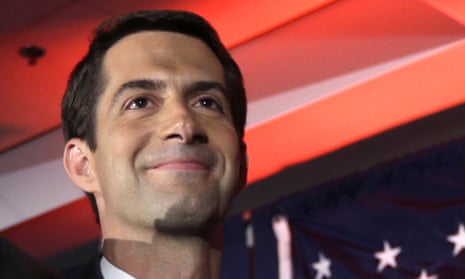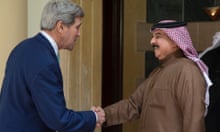The Republican letter to the Iranian leadership, claiming that any agreement it makes with the Obama administration could be disowned by its successor, raises a lot of questions.
One is how could 47 out of 54 Senate Republicans be so wrong about US constitutional and international law.
The letter is written in the patient tone of a kindly guide showing a busload of foreign visitors around the US Capitol building. “It has come to our attention that..you may not understand our constitutional system,” it says, before going to explain that President Obama’s autograph on a nuclear deal might not be worth much when he leaves office in just under two year’s time.
The style, oozing condescension, was pitched just right to cause maximum irritation to the Iranian foreign minister, Mohammad Javad Zarif, with his MA in international relations from San Francisco State University and his PhD from the University of Denver. He send back a waspish response calculated to out-patronise the senators and taking care to use longer words.
He noted “it seems that the authors not only do not understand international law, but are not fully cognizant of the nuances of their own Constitution.”
Zarif enjoyed the satisfaction of having a Harvard law professor weigh in heavily on his side of the argument in nearly identical words. “It appears from the letter that the senators do not understand our constitutional system or the power to make binding agreements,” Prof Jack Goldsmith wrote on the Lawfare blog. It is not clear whether Goldsmith ever taught Tom Cotton, the newly-elected 37 year-old senator from Arkansas and Harvard Law School graduate who drafted the letter.
The more important question now is whether the letter will up the negotiations, just as they enter their most critical and precarious phase. Diplomats from the US, Iran and five other world powers are due to fly to Switzerland on Sunday to begin the last big push to reach a framework agreement by the end of March. The UK’s foreign secretary, Philip Hammond, told MPs on Tuesday that the Republican letter could throw “a spanner in the works” at the negotiations will an “unpredictable effect” on the government in Tehran.
The ‘spanner’ effect was on display in the Iranian capital where the hardline press splashed news of the letter across its front pages. The moderate media focused instead of Zarif’s rebuke. But what really counts is the impact on one person, the Supreme Leader, Ali Khamenei. His judgement will be critical in determining whether there is an agreement at all, and he is famously suspicious of the West’s motives towards Iran.
That does not necessarily set the Supreme Leader apart from his people. The facts of Iranian history recommend caution when dealing with Washington and London. Most famously, the Americans and the Brits helped engineer the downfall of Iran’s elected leader, Mohammad Mossadegh, in 1953, and turned a blind eye to Saddam Hussein’s use of chemical weapons against the Iranians in the 1980’s.
Furthermore, it is a real concern for the Iranian negotiating team that the US will only be offering temporary sanctions relief, in the form of presidential waivers of congressional punitive measures, while Tehran is being asked to dismantled some of its prized nuclear infrastructure. They smell a possible trap.
So will the letter swing Khamenei away from a deal? Most Iranian analysts seem to think he will have already have factored in Republican antipathy when making his calculations. This is the take from the UK foreign office’s former Iran advisor, Hossein Rassam:
I don’t think the letter would immediately affect the negotiations, since Iranian negotiators have long been well familiar with both executive and Constitutional powers of the US president as well as his limitations, hence Iran’s persistence that the agreement shall come under the auspices of the UNSC and Chapter 7 of the UN charter.
Iranian-American journalist, Hooman Majd, author of The Ayatollah Begs to Differ and The Ministry of Guidance Invites You Not to Stay basically agrees, arguing all this last-minute sound and fury has been factored in:
While Senator Cotton’s “open letter” initiative does play into the hands of hardliners in Tehran - who’ve always maintained that the US cannot be trusted and any agreement with America is bound to be breached - the Supreme Leader, himself openly distrustful, is unlikely to allow the letter to affect the nuclear talks.
However, both Rassam and Majd agree that if the deal fails, the letter will help Tehran blame America, using that to split the six powers who have been leading the negotiations with the aim of dismantling international sanctions. So too does Ellie Geranmayeh, Iran analyst at the European Council for Foreign Relations:
The Supreme Leader most likely had predicted Congress would attempt to create crisis in the most critical stages of the talks - he will also be aware that if Iran continues negotiating in good faith, any failure to achieve a deal will be blamed on the US creating both domestic and international sympathy towards Iran.
But if the letter reduces the cost of Iran walking away, offering an easier way to break through the sanctions wall without giving anything up, that must reduce the chances that Khamenei, arguably both the swing and the casting vote in this endgame, will ultimately get to yes.








Comments (…)
Sign in or create your Guardian account to join the discussion